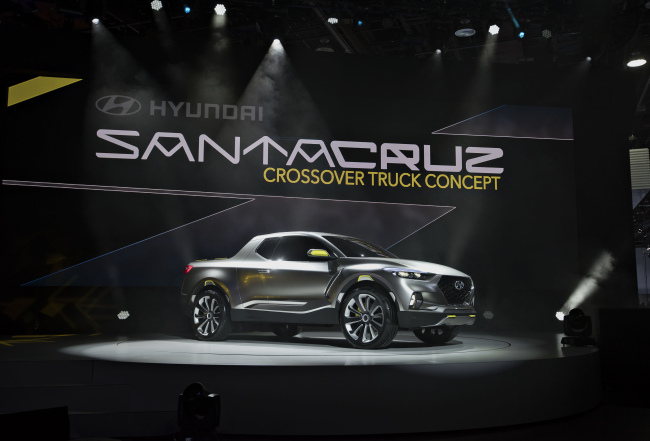Hyundai Motor, the nation’s top automaker, announced Monday that it would invest 2 trillion won ($1.8 billion) in raising its annual production capacity of commercial vehicles to 100,000 units ― a 54 percent increase from the current 65,000 units ― by 2020.
“About 80 percent of the investment will be allocated to research and development, while the remaining 20 percent will be spent on expansion of the commercial auto production line in Jeonju, North Jeolla Province,’’ the company said in a press statement.
The investment plan is expected to create about 1,000 jobs, which company officials said would contribute to vitalizing the local economy.
 |
A Hyundai Motor Santa Cruz crossover truck concept vehicle is displayed during the 2015 Detroit motor show last month. (Bloomberg) |
The automaker expects its mega-investment in the commercial auto sector to help it raise its global competitiveness in a sector where industry watchers forecast a 27 percent market expansion by 2020.
As of 2014, the global market share of Hyundai Motor in commercial vehicles stood at only 2.1 percent.
“If the investment plan is realized as planned, the company’s Jeonju plant could grow into a global production mecca for commercial vehicles,’’ the carmaker said.
R&D efforts will be focused on the development of buses and trucks targeting not only emerging markets but also those of developed countries, the company said.
Some of the workforce at the R&D center for commercial cars in Jeonju will be relocated to Hyundai Motor’s hub R&D center in Namyangju, Gyeonggi Province, to produce a synergy effect in new product design.
To present the firm’ strong will to expand the commercial auto business, Hyundai Motor unveiled its Santa Cruz pickup truck concept car at the 2015 North American International Auto Show in Detroit, in January. The concept car gained global attention with its unique design ― an SUV-like front design and a pickup truck-like rear design.
Despite the investment plan, Hyundai Motor’s commercial auto business is likely to face tough competition from foreign makers due to tightening emission standards on diesel-powered commercial vehicles at home.
The Korean government raised the emission standard for large commercial cars to “Euro 6” in September, which has given the green light to European automakers that have prepared for the regulation ahead of Hyundai Motor.
By Seo Jee-yeon (
jyseo@heraldcorp.com)






![[Exclusive] Hyundai Mobis eyes closer ties with BYD](http://res.heraldm.com/phpwas/restmb_idxmake.php?idx=644&simg=/content/image/2024/11/25/20241125050044_0.jpg)
![[Herald Review] 'Gangnam B-Side' combines social realism with masterful suspense, performance](http://res.heraldm.com/phpwas/restmb_idxmake.php?idx=644&simg=/content/image/2024/11/25/20241125050072_0.jpg)
